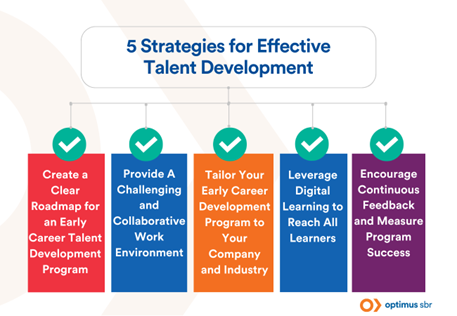Millennials, who have dominated the workforce for the past decade, are now ceding the stage to the next generation of employees – Generation Z. Carefully crafted early career talent development programs are essential for companies looking to grow their future leaders from within.
Why Talent Development Programs Matter
As global economic uncertainty continues to loom, organizations must look at least three to five years into the future to plan for and invest in employee development programs that ensure a steady stream of new, skilled employees to avoid skills gaps in the future.
Attracting early career talent and training them to become future leaders can be costly and time-consuming, but it’s an investment that pays dividends in the long run.
Strategies to Develop Early Career Talent
After helping numerous organizations design, develop, and implement best-in-class programs, we have identified 5 talent development strategies for successful early career talent development programs.

1. Create a Clear Roadmap for Your Early Career Talent Development Program
Before designing your early career talent development strategy, it is important to look at least three years into the future to think about and forecast what the organization will look like and what its human resources needs will be. When organizations look to invest in early talent development initiatives, they are building the organization’s future in the present moment and envisioning what the future will look like is critical to the process.
Once this vision is in place, the next key step is to define the talent development program’s goals and objectives via a roadmap. This roadmap needs to be clearly communicated to all stakeholders and existing employees so that everyone is aligned. Embarking on an early career development program requires senior leadership buy-in, commitment, and support from a budgetary, resourcing, and strategic alignment focus. When building an early career program, remember that you’re playing for the long term; it’s a 3–5-year commitment to build the next generation of high-performing employees. The program investment must also align with the organization’s long-term business strategy and goals.
2. Provide A Challenging and Collaborative Work Environment
Early career talent, especially Gen Zs, look for companies that offer an exciting and challenging work environment that provides opportunities for personal and professional growth. Create “on-the-job” learning opportunities that allow them to apply their expertise while also facilitating collaboration with more experienced colleagues across different functions. Effective feedback mechanisms are critical to establishing a healthy and safe work environment and having consistent and supportive feedback is especially important to Gen Zs. Accessing senior leader mentors, buddies, coaches, and networking opportunities with peers will also accelerate their professional development.
3. Tailor Your Early Career Development Program to Your Company and Industry
Developing early career talent for any industry is vital, yet creating a customized talent development program that addresses your specific industry challenges is even more critical. A tailored program that aligns with the company’s business objectives and considers what’s happening in the industry is essential. For example, in the tech industry, with technologies and products evolving so quickly, it’s necessary to improve talent development and offer continued formal training, to empower employees to keep up with developments and integrate new skills and learning into their roles. In addition to continued learning, internal organization processes, templates, and roles will need to be adjusted to support early career talent within the organization.
4. Leverage Digital Learning to Reach All Learners
As part of their talent development efforts, organizations must embrace new delivery methods to create personalized, flexible, and scalable training programs. Digital learning tools such as online courses, e-learning courses, and simulations or virtual classrooms provide early career talent with various learning options. These options promote self-paced learning and are highly convenient as they can be accessed on mobile devices, in real-time. Digital learning is cost-effective, purposeful, and more eco-friendly than traditional continuous learning options.
5. Encourage Continuous Feedback and Measure Program Success
To ensure successful talent development, measure key performance metrics and provide continuous feedback to learners, the program team, and the organizational sponsors. On-going measurement and evaluation are essential in helping early career talent understand their performance, what they’re doing well, and where they need to improve. Regular feedback is equally crucial for the program managers, as it helps them better evaluate the program’s success and identify required changes.
A Final Thought
Attracting and developing talent, and being able to retain top talent is essential for an organization’s sustainability and long-term success. By creating and executing a well-designed early career talent development program tailored to industry needs, organizations can give their new, skilled employees the tools to be successful and increase their speed to competence. Encouraging continuous feedback and measuring the program’s success is an essential component of keeping the training program relevant and assuring it delivers against desired key performance indicators. Investing in early career talent development delivers a strong return on investment. It attracts top talent looking for organizations with a clear employee growth trajectory and builds the organization’s next generation of leaders.
Optimus SBR’s Learning & Development Practice
At Optimus SBR, we know first-hand that building a great team is about attracting, retaining, and engaging top talent. We partner with clients to create scalable, targeted, experiential learning programs that enhance people leadership development, talent management, employee engagement, team collaboration, and performance results.
If you’re a leader looking to build an early career development program in your organization, please feel free to connect and learn more about opportunities to partner with us.
Giselle Kovary, Head of Learning & Development Practice
learning@optimussbr.com





Industry Insights
Service Insights
Case Studies
Company News